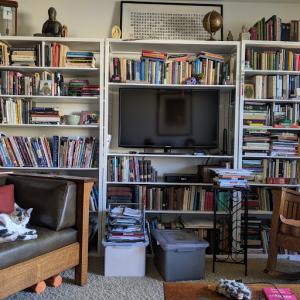I’ve been thinking of late about Zen and the intimate way in the West.
It goes in bunches of directions depending on one’s perspective and the perspective of one’s teachers.
In Japanese Zen one spends time in the monastery, usually between one and three years, and usually then trundle off to the family temple and a life as a parish minister.
Some stay and dig in. In Soto schools they pay less attention to the moments of clarity, and those who choose to stay rather than go on to parish life, enter a life dictated by the rounds of practice and liturgy. Well, Rinzai does that two, with the added value of koans.
But the bottom line is that some form of monasticism is what actual Zen practitioners do.
Chinese versions are different. There is no parish priest option. Your practice is monastic. Or, for some, householder. The literature is full of examples of enlightened lay practitioners. Some even receive dharma transmission. Always a minority, but from close to the beginning always an actual real option.
In truth ini all Asian cultures most householders don’t have formal practices. Instead embracing a simple devotion, and support of the practitioners sometimes as a practice, sometimes as a way of accumulating merit, and more likely mostly some combination.
But there have always been those householders. And some have been practitioners.
Here in the West we seem to be evolving hybrids. The dominant traditions derive from Japan. That noted, and the influences that dominance has had and its many influences, whatever tradition one finds, very few here in the West stay cloistered beyond getting a foundation for our life practice. Some only taste that monastic experience through retreat. A few not even that. But, for all regular meditation and some attempt at retreat are normative expectations.
So. here they are. Here we are. Many making Zen and the intimate way a central part of lives that also have a significant experience within the world. Working. Marrying. Raising children.
To one degree or another, a normative assumption of being a Zen person is being a Zen practitioner.
What this new category is does’t have a good name. Lay suggests not serious. It implies professionals and those who consume their services.
A while back I had an opportunity to visit Bhutan. I know next to nothing about the Vajrayana and its variants. But though past good karma or flat out undeserved good fortune, there I was. And there I learned about what they called Gomchen. These are people who do not take monastic vows, and stay in or close to community, but who are seen as fulfilling several sacred functions for the larger community. I kind of like it. And it covers both those who’ve ordained but live in the world and folk who’ve never formally ordained but are part of a third place between monastic and householder. But it is already claimed.
But it also hints at new directions, Here in the West a new class of practitioner is emerging. There are no good terms for who they, we are. Householder is often the placeholder. It suggests a primary of obligation. But it isn’t fully satisfactory either. For a variety of reasons I embrace and am owned by the term priest. But it is within this third way.
Whatever. We’ll be working on this, seeking clarifications for those who embrace a Zen life as a third category of practitioner for quite a while.
In the moment, just noticing and reaching for some right words.
In this moment Third Way Zen is sounding about right.













